Horticulture :: Vegetables :: Amaranthus
Amaranthus (Amaranthus sp L.)
Amaranthaceae
Varieties
- Co 1 (Mulaikeerai and Thandukeerai)
- Co 2 (Mulaikeerai and Thandukeerai)
- Co 3 (Clipping)
- Co 4 (Grain)
- Co 5 (Mulaikeerai and Thandukeerai)
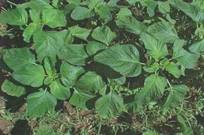 |
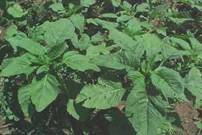 |
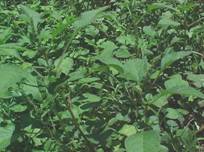 |
|
| Co 1 | Co 2 | Co 3 | |
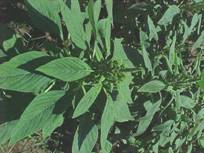 |
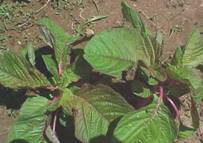 |
||
| Co 4 | Co 5 | ||
Soil
Well drained loamy soils with slightly acidic nature and warm climate are suitable for amaranthus cultivation.
Season and sowing
Sowing can be done throughout the year.
Seed rate
2.5 kg/ha of seeds broadcasted evenly on the beds after mixing with 10 parts of sand.
Preparation of field
The field is
prepared to a fine tilth and form beds of 2 x 1.5 m size. After
germination thin the seedlings to have a spacing of 12 – 15 cm.
Irrigation
Irrigate before and after sowing and at weekly intervals after germination.
Application of fertilizers
Apply FYM 25 t/ha, Azospirillum 2 kg and Phosphobacteria 2 kg/ha, N 75 kg and K 25 kg/ha as basal dose.
Plant protection
Pests
Ants
Apply Lindane 1.3% dust @ 10 kg/ha around the beds to control ants, termites and other burrowing insects.
Leaf eating caterpillar
It can be controlled by spraying Carbaryl 50 WP @ 2 g/lit.
Diseases
Leaf spot
Carbendazim @ 1 g/l of water. Spraying sulphur compounds should be avoided.
Harvest and yield
Leafy types
25 days after sowing for Mulaikeerai (10 t/ha)
40 days after sowing for Thandukeerai (16 t/ha)
40 days after sowing for Thandukeerai (16 t/ha)
Clipping types
10 clippings at weekly intervals (30 t/ha)
10 clippings at weekly intervals (30 t/ha)
Grain types
Co 4: 2.4 t grains/ha + 8 tonnes of tender greens.
Co 4: 2.4 t grains/ha + 8 tonnes of tender greens.
No comments:
Post a Comment